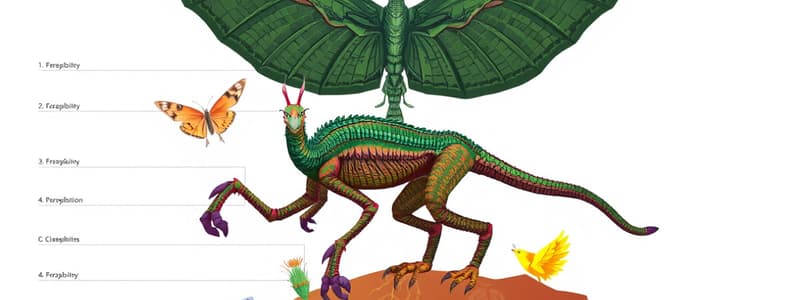Podcast
Questions and Answers
What is classification?
What is classification?
- A classification grouping that contains similar, closely related organisms
- The process of grouping things based on their similarities (correct)
- An organism made up of cells that have a nucleus enclosed by a membrane
- The scientific study of how living things are classified
What is taxonomy?
What is taxonomy?
- The process of grouping things based on their similarities
- A diagram that shows probable evolutionary relationships among organisms
- The scientific study of how living things are classified (correct)
- A classification grouping that contains similar organisms
Who is Carolus Linnaeus?
Who is Carolus Linnaeus?
A Swedish botanist who created the binomial nomenclature.
What is binomial nomenclature?
What is binomial nomenclature?
What does 'genus' refer to?
What does 'genus' refer to?
What defines a species?
What defines a species?
The levels of classification include: Domain, Kingdom, Phylum, Class, Order, Family, Genus, and ______.
The levels of classification include: Domain, Kingdom, Phylum, Class, Order, Family, Genus, and ______.
What are taxonomic keys?
What are taxonomic keys?
What is a prokaryote?
What is a prokaryote?
What is a eukaryote?
What is a eukaryote?
What characterizes the domain Bacteria?
What characterizes the domain Bacteria?
What differentiates domain Archaea from domain Bacteria?
What differentiates domain Archaea from domain Bacteria?
Which domain consists of organisms with eukaryotic cells?
Which domain consists of organisms with eukaryotic cells?
What defines the Protist Kingdom?
What defines the Protist Kingdom?
What characterizes the Fungi Kingdom?
What characterizes the Fungi Kingdom?
What is a major characteristic of the Plant Kingdom?
What is a major characteristic of the Plant Kingdom?
What is true about the Animal Kingdom?
What is true about the Animal Kingdom?
Who is Charles Darwin?
Who is Charles Darwin?
What is evolution?
What is evolution?
What is a branching tree diagram?
What is a branching tree diagram?
What are shared derived characteristics?
What are shared derived characteristics?
What is convergent evolution?
What is convergent evolution?
Flashcards are hidden until you start studying
Study Notes
Classification and Taxonomy
- Classification: Grouping organisms based on similarities.
- Taxonomy: Scientific study focused on the classification of living things.
Key Figures in Taxonomy
- Carolus Linnaeus: Swedish botanist and zoologist known as the "father of modern taxonomy"; developed binomial nomenclature, naming organisms using a two-part Latin system.
Naming Organisms
- Binomial Nomenclature: Each organism receives a unique two-part name indicating its genus and species.
Classifications and Groups
- Genus: A group containing closely related organisms.
- Species: A group of similar organisms capable of breeding and producing fertile offspring.
- Levels of Classification: Domain, Kingdom, Phylum, Class, Order, Family, Genus, Species.
Tools and Concepts
- Taxonomic Keys: Tools that aid in identifying organisms.
Cell Types
- Prokaryotes: Unicellular organisms without a nucleus or membrane-bound organelles.
- Eukaryotes: Organisms with nucleated cells; includes protists, plants, animals, and fungi.
Domains of Life
- Domain Bacteria: Prokaryotic cells characterized by cell walls with peptidoglycan; can be autotrophs or heterotrophs.
- Domain Archaea: Genetically distinct single-celled prokaryotes, often found in extreme environments.
- Domain Eukarya: Comprises organisms with eukaryotic cells like protists, fungi, plants, and animals.
Kingdoms of Life
- Protist Kingdom: Mostly unicellular eukaryotes; can be heterotrophic or autotrophic with examples like algae and kelp.
- Fungi Kingdom: Eukaryotic organisms that lack chlorophyll; includes yeasts, molds, and mushrooms.
- Plant Kingdom: Multicellular, eukaryotic autotrophs capable of photosynthesis, typically green.
- Animal Kingdom: Diverse eukaryotic organisms with adaptations for food procurement and digestion.
Influential Theories
- Charles Darwin: Natural historian known for the theory of evolution by natural selection; authored "On the Origin of Species" and "The Descent of Man".
- Evolution: The gradual change in organisms over time from ancient ancestors.
Evolutionary Relationships
- Branching Tree Diagram: Illustrates evolutionary relationships between organisms, depicting the order in which characteristics evolved.
- Shared Derived Characteristics: Traits unique to specific species or groups due to common ancestry.
- Convergent Evolution: The phenomenon where unrelated organisms evolve similar traits.
Studying That Suits You
Use AI to generate personalized quizzes and flashcards to suit your learning preferences.




